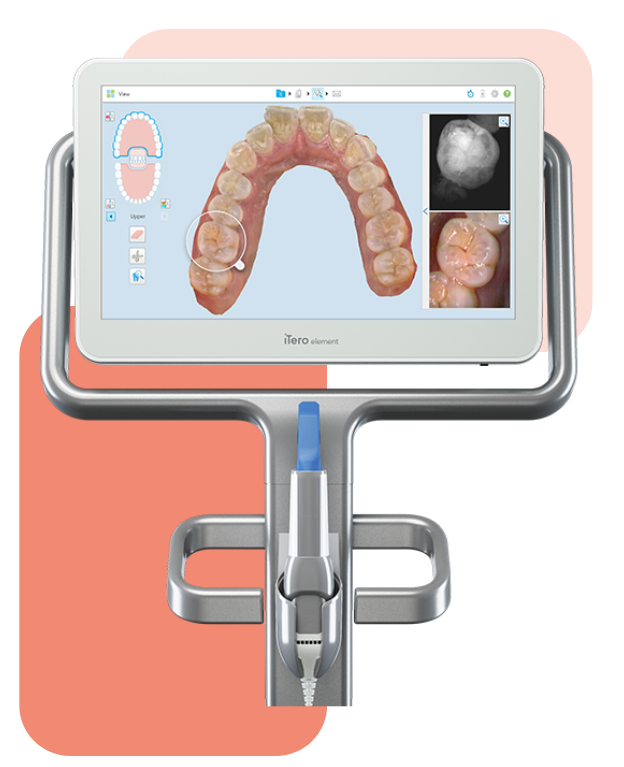Welcome to Nina Kumar DDS! The first appointment with Dr. Kumar and her team is an important one. We take the time to sort through your oral health needs and wants. We use this very important time to present oral health issues and options for treatment, as well as educating and empowering you with the knowledge to dictate your own oral health care status for years to come.
Feel free to call or email us with your initial questions.
Register in MyChart
Click here to register and create your profile in MyChart. The patient portal is curated to optimize your experience and our care based on the your oral risk.
Please understand that every question is crafted to provide us with specific information about your health so please take the time to read through and answer all questions thoroughly.
The Comprehensive Exam
We focus on the 5 areas of oral health:

With this systematic approach, we gain a comprehensive view of your needs. Your examination will include digital x-rays as well as a visual and physical exam to look for new cavities, weaknesses in teeth and existing restorative work, gum health, and identify any abnormalities in hard & soft tissues.
With this systematic approach, we gain a comprehensive view of your needs.
3D Intraoral Scan
The ITero imaging system simultaneously records 3D, intraoral color and NIRI image. With this technology, we can help our patients visualize diagnostic, restorative, or orthodontic comparisons like no other. The benefits 3D scanning with iTero include:
One imaging system does it all.
3D digital impressions and crisp intraoral scanning, treatment simulations, and all without harmful radiation.
Advanced Near-Infrared Technology
The first 3D intraoral scanner with Near-Infrared Imaging (NIRI) technology which aids in detection and monitoring of interproximal cavities.
Invisalign® Outcome Simulator
The Invisalign® Outcome Simulator can reveal potential orthodontic outcomes in seconds.
iTero TimeLapse Technology.
During Invisalign® treatment, patients can view treatment progress over time, keeping our patients engaged. This makes them more likely to take better care of their oral health and provide better outcomes overall.
Work more efficiently with our dental labs.
Working more efficiently with our labs means better outcomes for our patients.

Digital X-rays
A comprehensive exam also includes the digital x-rays as part of the diagnostic process.
Dental x-rays are used as a diagnostic tool, providing invaluable information. X-rays provide the details that can not be detected with our eyes and hands alone. Our objective is to identify issues as early as possible, and without x-rays, problem areas can go undetected and worsen with time, inevitably this necessitates more invasive, complex, and costly procedures. They are used to detect decay, bone loss, tumors, cysts, and numerous other dental issues while helping us to map the position of your teeth and their roots. Dr. Kumar uses this information to safely and accurately formulate a complete and thorough treatment plan.
The need for dental x-rays depends on each patient’s individual dental health needs. Dr. Kumar will recommend necessary x-rays based on the review of your medical and dental history, dental exam, signs and symptoms, age consideration, and caries risk. For our new patients, the initial x-rays provide us with a more accurate baseline for future assessments and evaluation of minor changes that could otherwise go unnoticed.
Digital dental x-rays are safe, producing a very low level of radiation. In New York standards, it is comparable to walking outside and many other everyday activities. We take necessary precautions to limit the patient’s exposure to radiation when taking dental x-rays which include using lead apron shields to protect the body, and the utilization of a digital x-ray system, which also reduces the amount of radiation exposure significantly compared to traditional films.
Frequently Asked Questions about Digital X-Rays
- Are dental x-rays safe? Dental x-rays produce a low level of radiation and are considered safe. We take necessary precautions to limit the patient’s exposure to radiation when taking dental x-rays which include using lead apron shields to protect the body, and as mentioned, utilization of a digital x-ray system, which also reduces the amount of radiation exposure significantly compared to traditional films.
- How often should dental x-rays be taken? The need for dental x-rays depends on each patient’s individual dental health needs. Dr. Kumar will recommend necessary x-rays based on the review of your medical and dental history, dental exam, signs and symptoms, age consideration, and caries risk. We recommend that new patients have x-rays. Additionally, the initial x-rays provide us with a more accurate baseline for future assessments and evaluation of minor changes that could otherwise go unnoticed.
Dental Prophylaxis
- Removal of calculus (tartar): Calculus is hardened plaque that has been left on the tooth for some time and is now firmly attached to the tooth surface. Calculus forms above and below the gum line and can only be removed with special dental instruments.
- Removal of plaque: Plaque is a sticky, almost invisible film that forms on the teeth. It is a growing colony of living bacteria, food debris, and saliva. The bacteria produce toxins or poisons that inflame the gums. This inflammation is the start of periodontal disease and should be addressed immediately.
- Teeth polishing: Remove stain and plaque that is not otherwise removed during tooth brushing and scaling.
Fluoride Treatment
Fluoride inhibits the loss of minerals from tooth enamel and encourages remineralization (strengthening areas that are weakened and beginning to develop cavities). Fluoride also affects bacteria that cause cavities, discouraging acid attacks that break down the tooth. Risk for decay is reduced even more when fluoride is combined with a healthy diet and good oral hygiene. Experts used to think that fluoride worked mainly by strengthening teeth while they were still developing. This meant that children were the focus of fluoridation efforts. Studies now show that topical fluoride — the kind in toothpastes, mouth rinses and fluoride treatments — helps fight decay in people of all ages, and therefore is as important in fighting tooth decay as in strengthening developing teeth.
In-office, we utilize topical fluoride, in the form of gel or foam. This is a preventative agent placed on tooth enamel that is contained in a tray and help against the teeth for up to 4 minutes. This gel/foam contains a much higher level of fluoride than the amount found in toothpastes and mouth rinses. These fluoride treatments offer extra protection in fighting cavities.
Oral Cancer Screening
Early detection is everything, nobody ever regrets a quick screening. During your routine exam, our team will also check for oral cancer. Signs or indicators include feeling for irregular tissue or bumps in your mouth, neck, and head. Many patients have abnormal spots or sores in their mouths, with majority being identified as non-cancerous. However, we are not risk-takers when it comes to our patient’s wellbeing. Which is why if we notice anything unusual or concerning, a biopsy may be recommended for further examination.
Developing Your Treatment Plan
The final step in the evaluation process is the development of an individualized treatment plan. The plan addresses your specific needs and is prepared by Dr. Kumar, utilizing her knowledge of all aspects of dentistry. This personalized approach provides coordinated care based on the options that are best for you.





